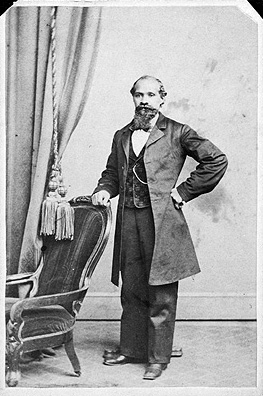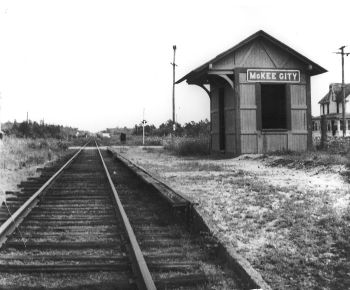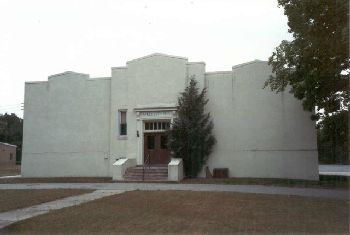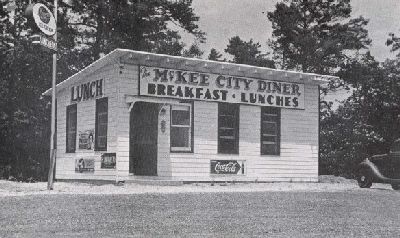
Colonel John McKee |
The city that is not a city was an area of
great expectation and about which fond hopes
and plans were laid by its founder, Colonel
John McKee. No one in this neighborhood remembers
him; only his name lives on, according to
the writings of the famous Atlantic County
Historian, Mr. Frank M. Butler, and that is
probably what Colonel McKee intended.
His property was about in the middle of Atlantic
County and consisted of a tract of four thousand
acres lying along the Newfield branch of the
Pennsylvania Reading Seashore Lines and Harding
Highway. About two-thirds of it was in Hamilton
Township, the balance in McKee City, Egg Harbor
Township. The latter area extended beyond
English Creek to this side of Cologne Avenue,
Pomona. Streets were laid out and houses were
built; simple houses resembling salt boxes.
Colonel McKee built his own sawmill near Reega.
The houses were very well constructed, with
strong foundations and all walls were lathed
and plastered. Most of these houses consisted
of two rooms downstairs, three rooms on the
second floor and two on the third. There was
no inside plumbing, nor heating. Almost all
of these houses had an open front porch, and
the Colonel furnished rails for a fence across
the front of the property and along the lanes.
He stipulated in the leases that the tenants
were to whitewash the fences once a year.
There were, in all, about eighteen farms along
the railroad, between English Creek Road and
the Reega flag stop and a few from English
Creek Road toward Pleasantville along the
railroad. All farms in this area consisted
of approximately fifty acres, while those
along Harding Highway were of about one hundred
acres. One of these one hundred acre farms
had belonged to Mr. Arthur Boerner for a long
time, and he was one of the early lessees.
He had been an outstanding Agricultural figure
in the County and came to the area with his
parents to one of the farms along the railroad.
The leases to these farms are most interesting
and show that the Colonel was a man of great
business acumen and meticulous to the tiniest
detail. One such lease, dated March Fourth,
Eighteen Hundred and Ninety-nine, was for
a property situated in McKee City, Hamilton
Township, along McKee Avenue. In the agreement,
the lessee was to clear ten acres of land
a year for five years. The lease stipulated
that, "a strip, five hundred twenty-five
feet or two and one-half lengths of rope deep,
extending the whole width of the farm was
to be cleared by cutting off the wood and
brush and burning the same; taking out the
stumps of the trees and hauling them in a
pile in back of the house."
Colonel McKee also decreed that in the first
year, two and one-half acres of rye and timothy
seed should be sown in the fall and the same
amount of clover in the spring; all seeds
to be sown at the rate of one-half bushel
to every two and one-half acres. No hay, straw
nor fodder was to be sold off the farms, but
were to be consumed right there. An interesting
fact also noted in the lease is the statement
that no liquor was to be sold on the property
nor was any of the property to be "underlet".
The tenants, furthermore, were forbidden to
cut down any cedar trees on the premises.
At the end of five years, if the tenants had
abided by all of the stipulations, they had
the privilege of re-leasing the farms for
ten additional years, at fifty dollars a year,
payable semi-annually.
He provided a school for the children, situated
along the railroad. It consisted of one main
schoolroom, a finished attic, and basement,
but no church was built. However, a Sunday
School was conducted by Mr. James B. Brown
Sr., in that building and later was continued
by Mrs. Mary Vaughn. The basement room of
that first school was also the home of the
first McKee City Grange, of which organization,
Mr. Alexander Heggen Sr., was the master.
Later, Mr. Arthur Boerner, of whom mention
has been made became master and held that
office for many years.
Some of the information which Mr. Butler
used in his history is credited to Mitchel
Hopkins, who is referred to as an aged Negro
who had many dealings with Colonel McKee.
Mr. Hopkins had stables on English Creek Road
and used to rent a horse and buggy to the
Colonel about every two weeks when he came
from his home in Philadelphia to inspect the
buildings and the farms. Many stories were
told by Mr. Hopkins as well as by the tenants
about the generosity of the Colonel; for instance,
at Christmas, a carload of toys and candy,
bolts of calico and other cloth, were distributed
among the families and a Christmas party was
given, presumably in the school house, since
there was no other building of any size at
that time. Later a community hall was built
on the corner of English Creek Road opposite
the McKee City Store. Other instances are
told of his furnishing a horse, a cow and
a few hogs to the tenants. Barns and other
necessary outbuildings were a part of the
equipment.

Building on right behind station is where the new CVS store is located today. English Creek Ave. can be seen crossing the tracks. The tracks have been replaced by the Bike Path. |
The community had a railroad station and
large freight house, since practically all
merchandise had to be delivered by freight
via the railroad. The railroad station also
housed the post office for the community.
Mr. Alex Heggen Sr. was postmaster there for
about forty-five years as well as being stationmaster
and telegrapher.
In addition to the school and station, there
was a small store. This store was across the
railroad tracks from the station. In 1923,
Mr. John Rose was engaged to enlarge the store
and dwelling and to provide a feed house to
care for the farmer's grain which was being
transported by rail. Mr. and Mrs. Rose became
the proprietors of this store which was run
by the McKee City Grange in a cooperative
venture. Stock was sold by the Grange and
the store became known as the McKee Farmer's
Exchange where general merchandise was sold
as well as grain. In 1926, the manager of
the store was changed to Mr. Rose's growing
building activity.

McKee City School, built during the Depression c.1930 |
In 1920, approximately, a two-room school
was built on English Creek Road, at the site
of the present McKee City School and in five
more years plans had to be made to enlarge
that school. Since the building site extended
back to Ivins Avenue, there was ample room
to move that school back and a brick addition
of two more classrooms on the upper floor
and a basement which housed a school kitchen,
auditorium, boys' and girls' toilet rooms,
a teacher's room (which later became the office
of the County Helping Teacher) plus a fire
proof boiler-room was built.
Colonel McKee hoped to perpetuate his name
further by building a large Catholic church,
school, convent and rectory, together with
a cemetery on a tract of land that was to
be set aside for that purpose. These buildings
and the cemetery were to occupy a space of
ten acres along the railroad. This was the
only bequest to the Catholic Church and came
as a great surprise to everyone for the Colonel
had always been a Presbyterian. He had also
planned to build a huge Catholic College on
some of his property in Bucks County, Bristol
Township, near Croydon, Pennsylvania. This
was to be patterned after the plan of Girard
College for Orphans or very poor boys. However,
he did not live long enough to see the fruition
of these plans.
Not all of McKee City was McKee owned, however.
There were many more acres in this territory
where people settled in the 1890's and conducted
prosperous businesses. Among these were Mr.
and Mrs. Richard Ahner, who started a large
poultry farm and built a beautiful home at
the end of Winnipeg Avenue. Mr. Ahner cut
that street through to Sixth Avenue at his
own expense. Another man who had a prosperous
early farm was Mr. James Molinari, now shortened
to Miller, the father of prominent Atlantic
County businessman, Mr. Anthony P. Miller.
Mr. Molinari brought grapevines from California
and planted ten acres in a very fine vineyard.
It is said that some of the finest wines that
came out of Atlantic County were a product
of that privately owned farm. These are only
two of the many farms that were noteworthy
that were started on ground not owned by Colonel
McKee.
When Colonel McKee came to Atlantic County,
the section in which he invested was little
more than a wilderness. There were few roads
and the railroad had just been laid. Before
he could realize his dream, death overtook
him at the age of eighty-one, but it did not
find him unprepared, for he had made his will
three years before and as a result of planning,
his hand continued to guide the destinies
of his holdings. This will was considered
to be practically foolproof in every detail.
It left the McKee property under the jurisdiction
of the Catholic Church for Nine hundred and
ninety-nine years.

McKee City Diner on the Black Horse Pike c. 1930 |
He believed in the land as a basis of wealth.
Whatever money he made in other ways, he put
into land ownership. It has been estimated
that at the time of his death, he had title
to more than 250,000 acres of coal, oil, mineral
and farm lands; some in Georgia and some in
Kentucky, some in West Virginia, about four
hundred parcels of very valuable land in Philadelphia
and the estate in Atlantic County.
Today, as we celebrate the Tercentenary of
New Jersey, the hopes of this millionaire
founder for a big city to rise up here have
not been realized and probably never will,
yet McKee City is a growing community. It
became necessary for the Catholic hierarchy
to dispose of the properties, although the
stipulated period had not passed, because
with decay of the buildings caused by the
passage of time and with rising taxes, the
farms had not been self-supporting for a good
many years. The railroad, once a necessity
for travel and freight has long since become
of little consequence except to a very few
business people. As the properties have been
sold off in building lots, many new and beautifu1
modern houses are being built, not only on
the sites where once stood McKee Farms but
also on new streets that have been cut through.
Many large poultry farms where thousands
of pullets are raised several times a year
are scattered over this area, and as a result
there are many poultry dressing plants that
are a necessity.
In the summer of 1960, a disastrous fire
totally destroyed the old McKee City Grange
Store, which for some time had passed out
of the hands of the Grange, for it had dissolved
and had become the property of Mr. A. Adamo,
who continued to sell farm supplies. That
has been replaced by a much larger and more
efficient plant, employing about ten men and
operates under the name of McKee City Distributors,
Inc., but is still owned by the Adamos. Another
feed distributor has a very large poultry
plant and is located on English Creek Road.
This business is owned and operated by Mr.
Harry Rubinfine and Son. Next to the school
where once was the beautiful home of McKee
City Grange, The Everitt Auto Body Shop now
hums with activity.
There is still plenty of ground on which
to build and room for a lot more business,
but the old timers breathe a sigh of relief
and there is a kind of nostalgia for the peace
and quiet of the old days, after the hectic
racing days of the summer are gone.
|




